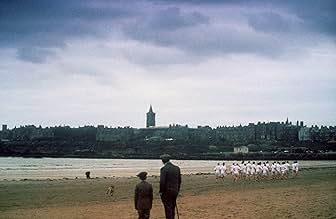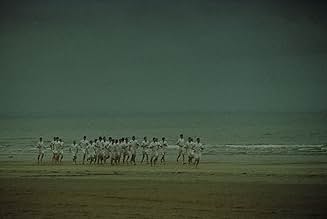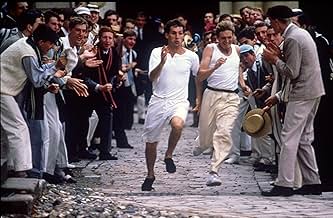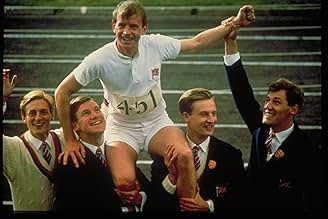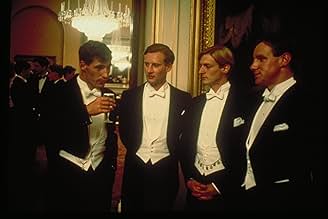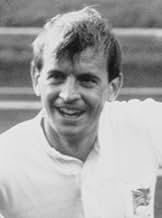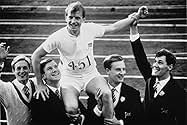Zwei britische Leichtathleten, einer ein frommer Jude und der andere ein frommer Christ, nehmen an den Olympischen Spielen 1924 teil.Zwei britische Leichtathleten, einer ein frommer Jude und der andere ein frommer Christ, nehmen an den Olympischen Spielen 1924 teil.Zwei britische Leichtathleten, einer ein frommer Jude und der andere ein frommer Christ, nehmen an den Olympischen Spielen 1924 teil.
- 4 Oscars gewonnen
- 18 Gewinne & 19 Nominierungen insgesamt
John Gielgud
- Master of Trinity
- (as Sir John Gielgud)
Empfohlene Bewertungen
I was a student at Edinburgh University in 1981 and was actually lodging with one branch of Eric Liddell's family.
My friends and I all went to see this movie repeatedly -- and I mean five, six, or seven paid entrances. Why?
Personally, I don't think it had anything to do with the plot, character development, the music, or moral virtue. It was simply that the film was so utterly beautiful.
The men were beautiful in a clean, non-glamorous way that we had never seen before. Not in British films, and certainly not in Hollywood movies.
The social and educational expectations shared by all were beautiful. I know it is fashionable to decry the British class system, and in principle I agree with all the criticisms. But it also seems that erasing class-by-birth leaves little else but crass meritocracy and the sheer vulgarity of the uneducated masses. Abraham's fellow students at Cambridge and Liddell's at Edinburgh participated in a social and educational system not driven by concerns about jobs, and not pathetically challenged by students who saw themselves as consumers and professors as entertainers.
Britain was beautiful. Of course some parts still are, but Nazi bombs, post-war architecture, and modern cars have destroyed much. This was a Britain where people at the time might have decried "Victorian" architecture, but we in 1981 were just coming to realize how great it was. And this was a Britain where, for good or ill, middle class people kept their houses tasteful, and working-class door-steps were white-stoned each week.
In all this movie was a connection to the beautiful aspects of the British past. That past might never have existed in reality, but in 1981 we could just about touch it, above all in Edinburgh, spared by German bombs and still one of the most beautiful cities in the world.
My friends and I all went to see this movie repeatedly -- and I mean five, six, or seven paid entrances. Why?
Personally, I don't think it had anything to do with the plot, character development, the music, or moral virtue. It was simply that the film was so utterly beautiful.
The men were beautiful in a clean, non-glamorous way that we had never seen before. Not in British films, and certainly not in Hollywood movies.
The social and educational expectations shared by all were beautiful. I know it is fashionable to decry the British class system, and in principle I agree with all the criticisms. But it also seems that erasing class-by-birth leaves little else but crass meritocracy and the sheer vulgarity of the uneducated masses. Abraham's fellow students at Cambridge and Liddell's at Edinburgh participated in a social and educational system not driven by concerns about jobs, and not pathetically challenged by students who saw themselves as consumers and professors as entertainers.
Britain was beautiful. Of course some parts still are, but Nazi bombs, post-war architecture, and modern cars have destroyed much. This was a Britain where people at the time might have decried "Victorian" architecture, but we in 1981 were just coming to realize how great it was. And this was a Britain where, for good or ill, middle class people kept their houses tasteful, and working-class door-steps were white-stoned each week.
In all this movie was a connection to the beautiful aspects of the British past. That past might never have existed in reality, but in 1981 we could just about touch it, above all in Edinburgh, spared by German bombs and still one of the most beautiful cities in the world.
The strength of this movie is the study in character contrast and development, with the added attractions of a historical setting and the soaring, ethereal musical score of Evangelos Papathanassiou.
The film is anchored in the character study of the introspective, brooding, and complex persona of Harold Abrahams, wonderfully portrayed by Ben Cross. Here is a man with all of the outward trappings of success: academic achievement, unexcelled athletic ability, wildly popular with his peers, yet tortured by an inbred inferiority complex and driven to lash out at the world in response. In the end, he conquers his inner demons through hard work, sacrifice, understanding of his fellow man, and the love of a good woman, to whom he opens his heart. I found myself thinking that Harold Abrahams is the kind of man I would want as my best friend, yet at the same time would find hard to become close with and relate to.
Ian Charleston's character (Eric Liddell) is a bit more one-dimensional. He is the archetypical Good Man, faithful to his family, his country, his friends, and his God. And in the end he triumphs through sheer force of will and by tapping that reservoir of inner strength that sustains him. As the crusty coach Sam Mussambini says, "He's a gut runner. Digs deep...".
It's a bit of a pity that the movie, long though it is, could not have delved more deeply into the other characters' background. Lord Andrew Lindsey is particularly appealing as Harold's and Eric's faithful friend who gives up his spot in his specialty race (the 400 m) to allow Eric a chance at the gold. Sybil Gordon is wonderful as Harold's love interest who tries to draw him out of his lonely world of bitterness and resentment and self-hatred ("You ran like a God. I was proud of you...", even after Harold loses a race for the first time in his life to a more determined Eric). Even some of the American competitors, who are only peripherally portrayed in the concluding segments, lend some color. Jackson Scholtz' reaching out to Eric Liddell gives one the sense that he knows the greatness of spirit that quietly resides in this unassuming Scotsman.
Its a wonderful story wonderfully told, and when its over you find yourself longing for it to continue, to see how these characters we've come to know over the previous two hours will turn out in the rest of their lives. Alas, the story of their lives is noted only in subtitles as the film closes.
The film is anchored in the character study of the introspective, brooding, and complex persona of Harold Abrahams, wonderfully portrayed by Ben Cross. Here is a man with all of the outward trappings of success: academic achievement, unexcelled athletic ability, wildly popular with his peers, yet tortured by an inbred inferiority complex and driven to lash out at the world in response. In the end, he conquers his inner demons through hard work, sacrifice, understanding of his fellow man, and the love of a good woman, to whom he opens his heart. I found myself thinking that Harold Abrahams is the kind of man I would want as my best friend, yet at the same time would find hard to become close with and relate to.
Ian Charleston's character (Eric Liddell) is a bit more one-dimensional. He is the archetypical Good Man, faithful to his family, his country, his friends, and his God. And in the end he triumphs through sheer force of will and by tapping that reservoir of inner strength that sustains him. As the crusty coach Sam Mussambini says, "He's a gut runner. Digs deep...".
It's a bit of a pity that the movie, long though it is, could not have delved more deeply into the other characters' background. Lord Andrew Lindsey is particularly appealing as Harold's and Eric's faithful friend who gives up his spot in his specialty race (the 400 m) to allow Eric a chance at the gold. Sybil Gordon is wonderful as Harold's love interest who tries to draw him out of his lonely world of bitterness and resentment and self-hatred ("You ran like a God. I was proud of you...", even after Harold loses a race for the first time in his life to a more determined Eric). Even some of the American competitors, who are only peripherally portrayed in the concluding segments, lend some color. Jackson Scholtz' reaching out to Eric Liddell gives one the sense that he knows the greatness of spirit that quietly resides in this unassuming Scotsman.
Its a wonderful story wonderfully told, and when its over you find yourself longing for it to continue, to see how these characters we've come to know over the previous two hours will turn out in the rest of their lives. Alas, the story of their lives is noted only in subtitles as the film closes.
"Chariots of Fire" is a fine motion picture that won the Best Picture Oscar in 1981, even though it was the longest of long-shots. The film deals with two young Englishmen (Ben Cross and Ian Charleson) who have hopes of glory at the 1924 Olympics. We see that their struggles almost cost them the opportunity to achieve the greatness that they both desire. When they are both ultimately successful, Charleson feels that his win is due to God's glory and accepts the medal with the greatest of pride and admiration. However, after Cross wins the gold he feels somewhat disappointed and realizes that what he thought he wanted was not what he really wanted at all. The insight into this motion picture is amazing. Both athletes convey very common feelings that most people experience if they are serious enough in what they are doing, whether it be sports or something else. The main focus of "Chariots of Fire" is that the journey to get to the destination is more important and uplifting than the destination itself. Many question the fact that this film won the Best Picture Oscar over "Reds" and "Raiders of the Lost Ark". However, this is one time I cannot say anything negative about the Academy's decision. The fact that this film won in 1981 is testimony to the fact that the Academy is one of the greatest organizations in the world. Kudos to all involved here. 5 stars out of 5.
'tis been said that this movie is loved or hated, no middle ground.
I believe I know why.
It touches the most fundamental instincts and feelings in all of us.
The question it compels us to ask is, "Do I have a piece of greatness to offer to the world"?
Those of us who would answer yes, whether we believe is achievable or not, would love this movie, because it epitomizes the potential of our dreams, not just in running, but in any walk of life.
Those of us who would answer no, would hate this movie, because it highlights our acceptance of mediocrity, and of surrendered dreams.
Also, this movie touches those who have succeeded also.
It shows that there are two ways to succeed, the one not shown in the movie, and the one shown.
The one not shown is the one that motivates most truly successful people today. win at any cost, in sports, business, etc. and the consequences be damned.
The way to succeed shown in Chariots of Fire is probably naive by today's standards, but nonetheless noble and uplifting.
It tells us that success achieved through dedication, commitment, honesty and sacrifice is the noblest achievement a person can attain, and provides examples for others to emulate.
Liddell and Abrahams are not examples for runners, they are examples for people, true heroes of the spirit, not sport.
An unforgettable phrase, a torch to some and a knife to others,
" So where does the power to succeed come from?... It comes from within"
Those of us who have it, love it, those of us who do not have it, hate it.
If I live to be 100, I will still have my dreams stirred back to life by the message in this film
I believe I know why.
It touches the most fundamental instincts and feelings in all of us.
The question it compels us to ask is, "Do I have a piece of greatness to offer to the world"?
Those of us who would answer yes, whether we believe is achievable or not, would love this movie, because it epitomizes the potential of our dreams, not just in running, but in any walk of life.
Those of us who would answer no, would hate this movie, because it highlights our acceptance of mediocrity, and of surrendered dreams.
Also, this movie touches those who have succeeded also.
It shows that there are two ways to succeed, the one not shown in the movie, and the one shown.
The one not shown is the one that motivates most truly successful people today. win at any cost, in sports, business, etc. and the consequences be damned.
The way to succeed shown in Chariots of Fire is probably naive by today's standards, but nonetheless noble and uplifting.
It tells us that success achieved through dedication, commitment, honesty and sacrifice is the noblest achievement a person can attain, and provides examples for others to emulate.
Liddell and Abrahams are not examples for runners, they are examples for people, true heroes of the spirit, not sport.
An unforgettable phrase, a torch to some and a knife to others,
" So where does the power to succeed come from?... It comes from within"
Those of us who have it, love it, those of us who do not have it, hate it.
If I live to be 100, I will still have my dreams stirred back to life by the message in this film
What an amazing movie it is... amazing is the word! I saw the movie today - on the 5th of Feb '09. What a pity that i couldn't experience the movie's aura earlier!
Chariots of Fire is an outstanding piece of work which may be easily, and deservedly so, termed as LEGENDARY! Watch this movie and you'll know what is inspiration and dedication...
The characterization is such exemplary that each and every character tell their own little story... The two main characters - Lindell and Abrahams - are such that you'll only want to know them better as you go on watching the movie... especially that of Lindell. The guy is so so dedicated and truthful that i for one would just feel honored to know him closely.
Guys, WATCH IT!!!!!!!!!!!!
Chariots of Fire is an outstanding piece of work which may be easily, and deservedly so, termed as LEGENDARY! Watch this movie and you'll know what is inspiration and dedication...
The characterization is such exemplary that each and every character tell their own little story... The two main characters - Lindell and Abrahams - are such that you'll only want to know them better as you go on watching the movie... especially that of Lindell. The guy is so so dedicated and truthful that i for one would just feel honored to know him closely.
Guys, WATCH IT!!!!!!!!!!!!
Oscars Best Picture Winners, Ranked
Oscars Best Picture Winners, Ranked
See the complete list of Oscars Best Picture winners, ranked by IMDb ratings.
Wusstest du schon
- WissenswertesWhen Colin Welland completed his first draft, the only title he could come up with was "Runners". Then, one Sunday evening he turned on BBC's religious music series Songs of Praise (1961), featuring the hymn "Jerusalem," with lyrics from a poem by William Blake. The chorus included the words "Bring me my chariot of fire". The writer leaped to his feet and shouted to his wife, "I've got it, Pat! 'Chariots of Fire'!" (The "Jerusalem" hymn is featured at the beginning and end of the movie.)
- PatzerWhen signing an autograph for a young fan, Eric Liddell does not unscrew or remove any cap from the pen he uses. As all fountain pens have caps, he seems to be using a modern day ballpoint pen which was not invented until 1938.
- Zitate
Eric Liddell: I believe God made me for a purpose - but He also made me fast. And when I run, I feel His pleasure.
- Alternative VersionenThere is at least one slightly different version of the movie, issued in Europe on homevideo. The beginning is different - shorter - and introduces Harold Abrahams while playing cricket with his colleagues. The scene in the train station, where Monty meets Harold is absent, as well as the loading of the baggage in the taxi they share. We simply see Monty writing a letter to his parents, mentioning that "Harold is as intense as ever" (cut to the cricket scene, maybe 30 seconds long), and then continues with "I remember our first day... we shared a taxi together" (cut to the two students unloading their stuff from the car). This alternate version also have slightly different end credits, and does not mention Harold marrying Sybil. The differences are minor (the U.S. version provides a more shocking memento of WWI, when it shows crippled baggage handlers in the station); one of the reasons the cricket scene was dropped in favour of the station one was due to the distributor's worry that the American market would not understand it.
- VerbindungenFeatured in Vangelis: Chariots of Fire (1981)
- SoundtracksHe is an Englishman
(1878) (uncredited)
from "H.M.S. Pinafore"
Music by Arthur Sullivan
Lyrics by W.S. Gilbert
Top-Auswahl
Melde dich zum Bewerten an und greife auf die Watchlist für personalisierte Empfehlungen zu.
- How long is Chariots of Fire?Powered by Alexa
Details
- Erscheinungsdatum
- Herkunftsland
- Sprachen
- Auch bekannt als
- Carros de fuego
- Drehorte
- Produktionsfirmen
- Weitere beteiligte Unternehmen bei IMDbPro anzeigen
Box Office
- Budget
- 5.500.000 $ (geschätzt)
- Bruttoertrag in den USA und Kanada
- 58.972.904 $
- Eröffnungswochenende in den USA und in Kanada
- 68.907 $
- 27. Sept. 1981
- Weltweiter Bruttoertrag
- 59.317.376 $
- Laufzeit2 Stunden 5 Minuten
- Farbe
- Sound-Mix
- Seitenverhältnis
- 1.85 : 1
Zu dieser Seite beitragen
Bearbeitung vorschlagen oder fehlenden Inhalt hinzufügen








